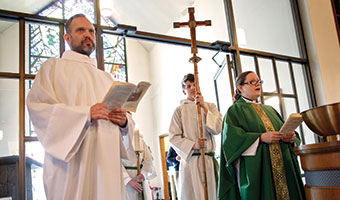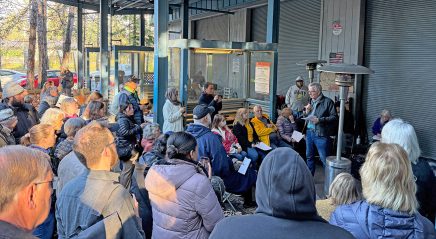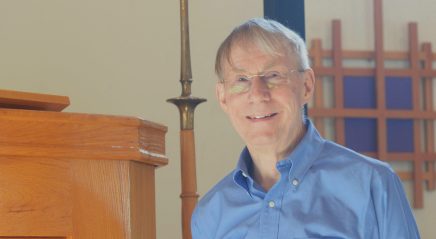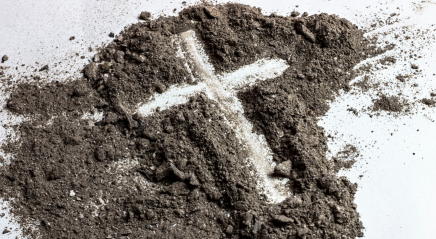When members of Good Shepherd Lutheran Church in Harrisburg, Pa., think about giving, the possibilities include not only money or time but organs.
Extraordinary events put organ donation at the forefront of their thoughts. One of their members, Chris Pollock, is the second person in the U.S. to get a double-hand transplant, and the first to receive one including a forearm and elbow. Another member, Steve Turner, gave a kidney to a stranger, setting off a chain in which four people received transplants.
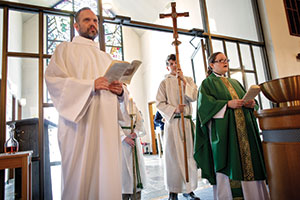
Dan Gleiter/PennLive
Chris Pollock (above, left), assisting minister at Good Shepherd Lutheran Church, Harrisburg, Pa.,
Good Shepherd recently held an event to celebrate the transplant anniversaries and reflect on the possibilities surrounding organ donation. Asked about the “coincidences” that led to it, their pastor, Kathy Baker, offered a simple explanation: “In the church, we call it God’s work.”
But back to Pollock
Pollock was helping a friend harvest corn the day after Thanksgiving in 2008. He spent the day on a tractor pulling an ancient corn picker that deposited the harvest in a wagon.
Near evening he hopped down to check the wagon. Noticing cornstalks caught in a chute, he reached out. A chain caught his sleeve and pulled his hand into the machine. Pollock reflexively reached with the other. It, too, became caught. He knew immediately his hands were lost. Alone for 30 minutes until help arrived, he wanted to die.
Pollock was given hooklike prosthetics that enabled him to drive. Eventually he read a magazine story about the first U.S. double-hand transplant, which took place at the University of Pittsburgh Medical Center.
In early 2010, Pollock received his transplant at the center during an 11-hour operation involving three teams totaling about 30 people. The transplant landed him on Good Morning America and drew reporters from Europe.
For the first seven months after his transplant, Pollock did therapy six hours a day, five days a week. He went four days a week for several years after that.
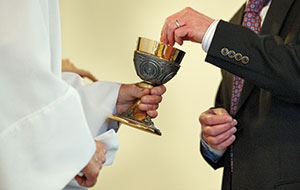
Dan Gleiter/PennLive
Pollock offers the chalice during communion.
Therapy is intense and recovery takes years. Discouragement is a possible side effect — the first man to receive a double-hand transplant in the country eventually asked for his hands to be removed.
Just six months ago on a frigid morning, Pollock parked at the medical building he’s been entering for more than four years. There occupational therapist Jana Poole laid warm towels over his hands. Then she began stretching a hand backward at the wrist, continuing the quest for the fullest possible range of motion.
Pollock now goes for therapy once a week, for 90 minutes. His strength might be plateauing, but even after his hands stop getting stronger, he continues to gain function through practice and mastering new ways to do things. He drives, signs his name, peels an egg, cooks and cleans, and operates a snowblower.
“Some people would stall out and not continue to try new things,” Poole said. “He has never not tried.”
A faith-altering accident
Pollock had been depressed following the accident. His parents had recently joined Good Shepherd and his father invited him to attend. Baker, their pastor, also had visited him in the hospital. Soon Pollock, who hadn’t gone to church regularly since confirmation, was attending Sunday and Wednesday services at Good Shepherd.
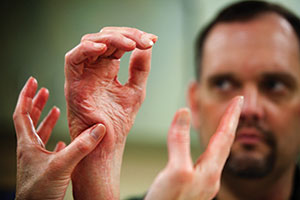
Jenny Kane/PennLive
Pollock still reports to therapy once a week.
As his hands have grown stronger, so has his involvement at church. Now he handles the wine chalice during communion.
“There are a lot of special people at our church,” he said.
One of those people is Turner, who was eating a Thanksgiving Day meal with his family when he started thinking about the shortage of donor organs. He pictured people who needed kidneys, wondering if they would see another Thanksgiving. It happened to him again at Christmas.
A few days later, Turner called a local hospital and arranged to make a “Good Samaritan” kidney donation.
The 58-year-old lawyer considers it a blessing that people can make such a donation or check a box on their driver’s license allowing their organs to be donated if they die in an accident.
“It’s another chance at life,” Turner said. “Chris is the living proof that by someone being generous enough and their family supporting that decision, Chris can have hands again. That is amazing and fantastic and miraculous. The gift, as you leave this planet, to save someone is just incredible.”
Looking to the future
Pollock now attends Harrisburg Area Community College. At 46 he looks like any other student as he grips a smartphone, his fingers routinely tapping out texts.
Once a career mechanic in the Army, then the National Guard, Pollock also faces the challenge of finding a new career. He had joined the Army right after high school because of his mechanical aptitude and preference for working with his hands. While capable, his hands won’t hold up to full-time mechanic work, he said.
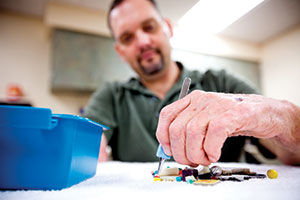
Jenny Kane/PennLive
Pollock’s hands are strong and he is working on gaining functions.
“I used to use my hands constantly. Now it’s going to be all thinking,” he said. “I’m the kind of person who wants to be mobile. I can’t sit in a cubicle. That’s what’s hard for me to face.”
He describes how he used to be — playing the lottery and longing for fast fulfillment. He forever rushed to be “done.” It might have contributed to his accident, he said. He no longer rushes. He enjoys one day at a time, focusing on the doable and the meaningful.
A few years ago Pollock started a new “family tradition,” where he and his son run in a Thanksgiving Day turkey trot.
After his accident, people told Pollock it happened for a reason. He wasn’t so sure. But he is gratified that people tell him his recovery inspires them. “I think God knew I’m the kind of person who won’t give up,” he said.
Photos used with the permission of Pennlive.com © 2015. All rights reserved.


